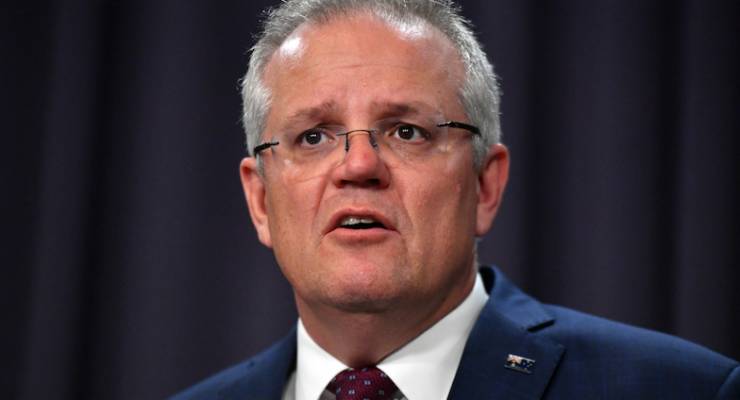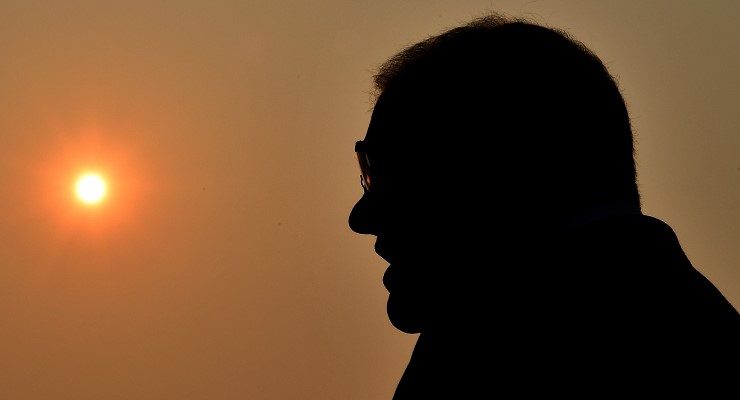
In the war of words that has surrounded the bushfire crisis, the status and role of climate change has been very much to the fore. In this context, I decided to investigate exactly what the PM has said — and not said — about this issue.
What was analysed
My linguistic study involved analysis of the transcripts of all the PM’s media communications during the height of the emergency (December 29 to January 6) as posted on the government’s website.
These communications included six press conferences, four media releases, five radio/TV interviews and two speeches at official functions. The total number of prime ministerial words analysed was 36,500.
The most striking finding was the almost total absence of the use of the term “climate change” in the PM’s discourse — on no occasion was the subject raised by the PM voluntarily. The only time the term was mentioned was when he was forced to address the subject in response to a journalist’s question.
A three-step structure
So, when the PM was forced through the interrogations of journalists to actually address the issue, how was this framed? In the limited number of examples in my analysis, a discernible structure could be observed:
MOVE ONE: Provide some acknowledgment of the existence of climate change and the need for action.
MOVE TWO: Mention other factors that serve to minimise the importance of climate change/or action to mitigate it.
MOVE THREE: Trumpet the achievements of the government in meeting its climate commitments.
The following is an example of this structure taken from a Scott Morrison press conference on January 2:
“[MOVE ONE] I’ve always acknowledged the link, as has the minister, between the broader issues of global climate change and what that means for the world’s weather and the dryness of conditions in many places. [MOVE TWO] But I am sure you would also agree that no response by any one government anywhere in the world can be linked to any one fire event and I don’t think you’re suggesting that here in New South Wales, Victoria or anywhere else. [MOVE THREE] The government’s plans on climate change are very clear and the achievements we are making we have set out well. This year, 2020, is the year we beat the Kyoto 2020 commitment.”
Let’s break these down individually.

MOVE ONE: Provide some acknowledgement of the existence of climate change and the need to take action
Here’s another example from the PM: “I should stress that there is no dispute in this country about the issue of climate change globally.”
This move is typically made in a defensive, even overstated, way (“I’ve always acknowledged the link”). It is not rendered as a simple assertion of fact, e.g. “climate change is a major factor in the current crisis”, but instead comes with a fair amount of additional linguistic material such as “there is no dispute that…” or “of course, my government…”
Such terms (“of course”, “there is no dispute”) are known as modals (or modal adjuncts), and have the function of signalling a speaker’s attitude to what they are saying.
Their effect is often to qualify or cast doubt on the assertions being made. A lover who is told “Of course, I love you”, for example, is far less reassured than one who receives a simple “I love you”.
MOVE TWO: Mention other factors that serve to minimise the importance of climate change/or action to mitigate it
The notable feature of this move is that it is framed with a big “BUT”. Once the acknowledgment has been made, there is quick recourse to this conjunction, the function of which is to undermine the significance of what has just been said, as in the following:
So we’re going to keep taking action but let me say this, this is one of many factors and I don’t think anyone believes that any one policy on climate can be attributed to these fires.
Once you’re tuned into the technique, it’s not hard to hear the BUT coming:
“There is no disagreement about [the need to take action on climate change]. … BUT I’ve got to tell you, as I’ve toured fire grounds and as I’ve sat with the victims of these fires, the most constant issue that has been raised with me has been the issue of managing fuel loads in national parks.”
A key role of the “but” in this context is to present other factors (like fuel loads) as rival explanations that one must somehow choose between.
As a number of commentators have pointed out, these different factors (and the policy responses they imply) should not be seen as either/or options, but can all be part of an overall strategy. An alternative discourse here — one that wanted to affirm climate change as a factor — would be to frame messages not with a BUT (an adversative conjunction), but with an AND (additive conjunction).
MOVE THREE: Trumpet the achievements of the government in meeting its climate commitments
This move can be characterised as “going on the front foot”. There is typically a rolling out of figures, targets and achievements — much of which, it must be said, is quite beyond the comprehension of the public. The effect is to give an appearance of decisive and comprehensive action:
“The government’s plans on climate change are very clear and the achievements we are making we have set out well. This year, 2020, is the year we beat the Kyoto 2020 commitment. We don’t just beat it by a bit, we beat it by a lot. We are one of the few countries that can actually say that.”
Significantly, the claims to action — disputed in many quarters — become the basis for insisting that no additional action is necessary.
Conclusion: there’s significance in the silence
Words have literal meanings and there is no doubt that the PM has made statements acknowledging the existence of climate change and the need for action. But these messages need to be understood in terms not only of what is said, but also by what is not said.
It is highly significant that the only times the PM directly addressed the issue of climate change at the height of the emergency was when he was pressed to do so.
Scott Morrison has been at pains to insist that he and his party are not climate change denialists, but this wilful avoidance of the subject — when he has been able to get away with it — suggests that “denialist” is probably the right description.
As pressure mounts on the government around the climate issue, it will be interesting to chart if there are any shifts in the prime ministerial rhetoric on this subject in the days ahead.
Tim Moore is a lecturer in linguistics and literacy at Swinburne University.








Thanks, Tim. Analysis by experts is always fascinating, as yours was. We all need only remember the image of Morrison, lump of coal in hand, on the floor of the parliament, haranguing those who sought sensible debate on climate issues, to understand the deep meaning of your analysis.
And Move 4:
Volunteer a gratuitous insult of an Opposition Member.
Or even of a relatively sensible state minister.
It would be hard to say even with this. I would say he is a self righteous, power hungry, false Christian windbag with no integrity on anything and happy to take the bribes of the coal industry donations.
An interesting analysis which raises at least two other important questions:
1) Why, in the face of so much incontrovertible evidence, is he still a denialist?
2) What will it take to shift his denial?
I mean, with regard to the second question, if twelve million hectares of scorched earth, twenty-nine human deaths, more than 2600 burned houses and whole communities erased from the map, and as many as seven hundred species now extinct – gone forever – don’t do it, what will?
You don’t get the nature of this virulent form of denialism or its importance as a cultural marker.
Denialism is specifically disconnected from reason, reality and especially review. Wait until the middle of the year when our now short window of non fire season runs. They’ll be blithering white spittle with renewed vigour in direct proportion to the area destroyed by fire.
As a cultural marker climate denialism is now THE defining trait of the true right winger (which they falsely call conservative) in Australia and the US. A form of not so secret handshake if you will.
Banning political donations and banning the move into post parliamentary sinecures might stop the denialism.
Only the deep, booming voice of a gigantic, white bearded, white skinned God, emerging from the clouds amidst glowing beams of sunlight, saying “Scott, it is time to repent!”
A good effort Tim, glad you had the energy and determination to wade through all that dross so we didn’t have to….looking for virtue and truth that is totally lacking in the man.
Like a blind man in a dark room, looking for a black hat that isn’t there….